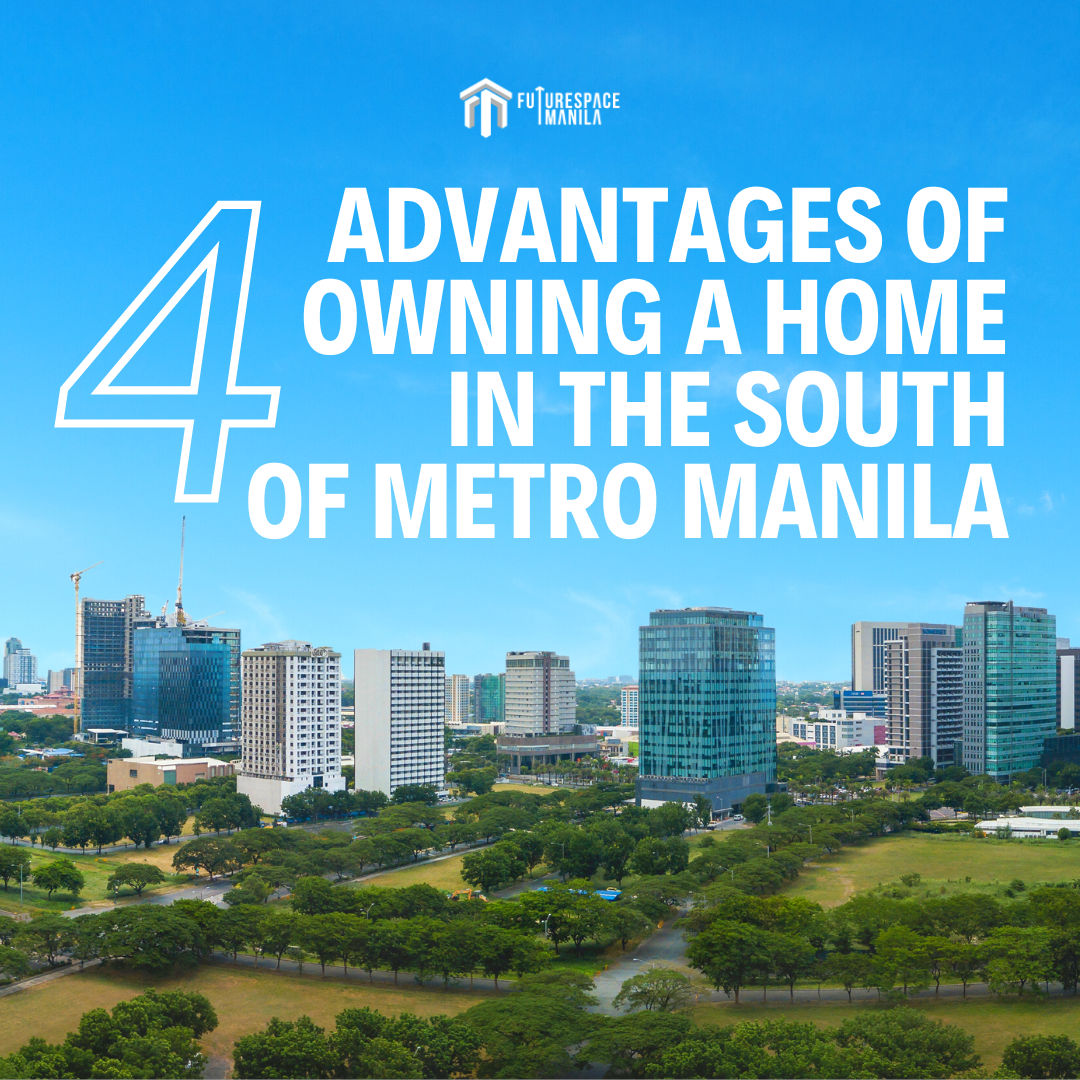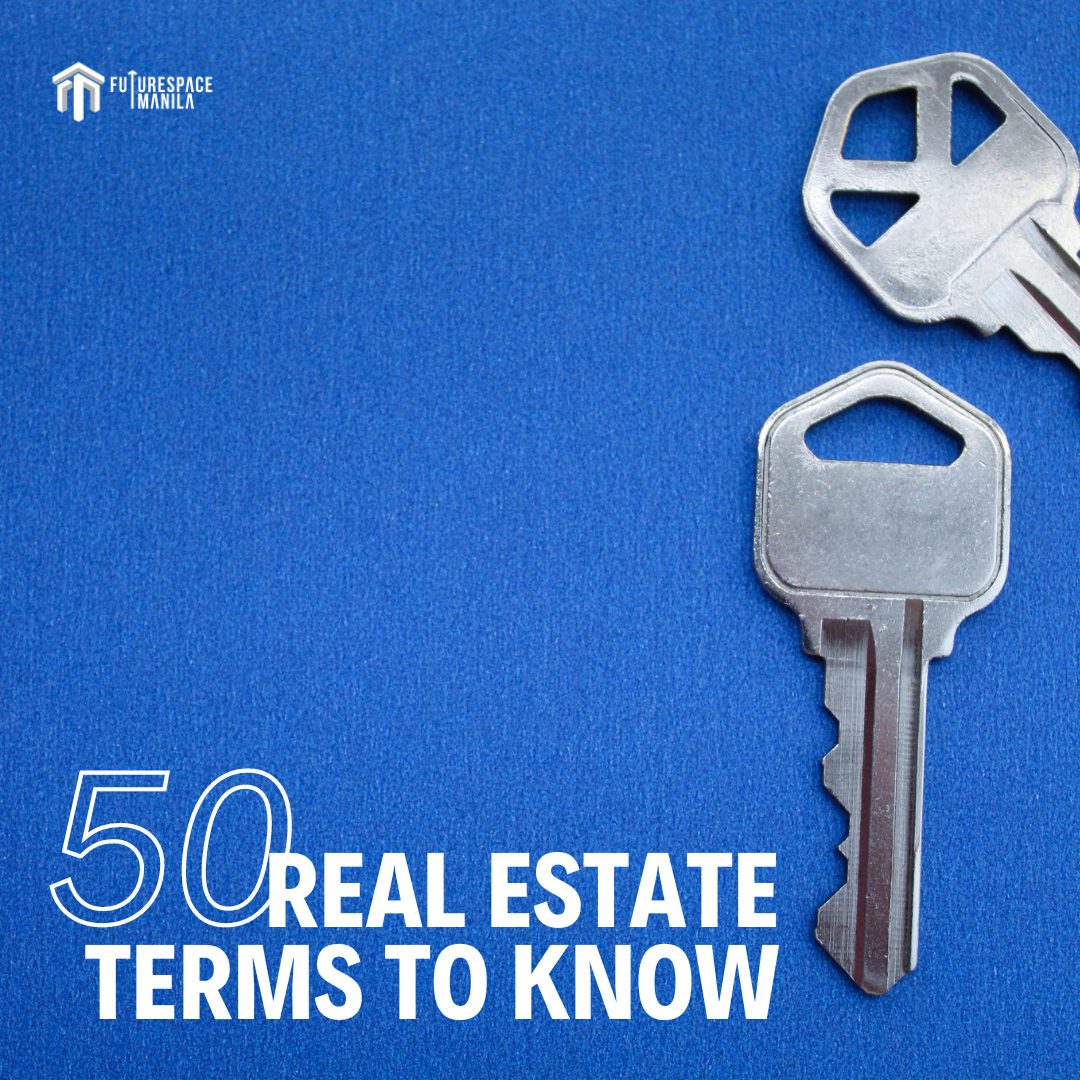|
Owning a real estate property in Metro Manila, Philippines does have its perks. Living right smack the bustling business districts of the metro and being at the front and center of city life's daily grind can be exciting for someone who craves the chaos of the urban jungle.
But with the good comes the bad. Along with the thrill that Metro Manila offers comes the overpopulation of the city, the horrendous traffic jams, the worsening floods in the cities, and the growing sanitation concern. Not to mention, the cost of living is way higher than the areas outside Metro Manila. Are you planning to make a property investment in the near future in the Philippines? Be it a condo, land, or a house and lot, it would be wise to consider properties in the south of Metro Manila specifically the cities of Las Piñas, Parañaque, and Muntinlupa, even the provinces of Laguna and Cavite. These areas are all known for their relaxed vibe, peaceful ambience where raising families and living a more quiet life is fitting. With the South Luzon Expressway and the Metro Manila Skyway bridging these cities, commutes to the Bonifacio Global City, Makati and Quezon City are a lot easier for residents of the south. Moreover, investors looking to buy a new home, be it condos or house and lot, have plenty of property types to choose from since these areas in the south are fast constructing condominiums and developments, with business and commercial districts and major places of leisure and convenience nearby. Below are more encouraging reasons and benefits of owning a home in south of Metro Manila. 1. Get away from the congestion and pollution of Metro Manila It is undeniable that the rest of Metro Manila is congested given the daily traffic that commuters experience, not to mention the pollution is worsening too considering the many cars and infrastructure in the capital. This is why a home in the south boasts of a quiet lifestyle that brings you closer to cleaner air and nature. The Environmental Management Bureau, in fact, attests that cities in the south of Metro Manila are less polluted than those in Metro Manila's north areas. This is due to the various LGUs’ stricter implementation of the Clean Air Act from various LGUs, the area’s lower density, and the fact that there are fewer factories situated in the south. 2. Fast-developing urban spaces Picking a location in the south of Metro Manila might seem like you'll be away from the rest of the metro but this won't mean you'll have access to the conveniences of the urban living. The south boasts of their own central business district, major shopping malls for both high-end and mid-market, topnotch schools, competent hospitals and healthcare centers. Not to mention being located here means less travel time when you want to escape to Tagaytay or Laguna. 3. Reap the Benefits of Major Infrastructure Take your worries off commuting woes. Major expressways and highways will soon make the business districts of Metro Manila nearer to your community. With the construction of the Muntinlupa–Cavite Expressway (MCX), connecting Daang Hari Road with the South Luzon Expressway, commuters from Muntinlupa who wish to reach Bacoor and Imus can now avoid the congested Alabang–Zapote Road and get there in less than 30 minutes. Other projects include the Laguna Lakeshore Expressway, a 47-kilometer expressway dike that will run from Taguig to Calamba along the western shores of Laguna de Bay, and the Cavite–Laguna Expressway (CALAX) Project, which will very soon connect Imus, Cavite, with SLEX at Mamplasan Interchange. When these projects are finished, vehicular traffic along the area’s major thoroughfares will be greatly decongested. 4. Get easy access to leisure destinations A residential spot in Parañaque and Muntinlupa strategically places you near the South Luzon which gives you a very convenient access to Laguna. In addition, Manila–Cavite Expressway starts from Parañaque along the coast of Manila Bay and traverses Las Piñas, going to the province of Cavite. These two important expressways make it easy for southern residents to reach Laguna's, Cavite's, Batangas' popular vacation spots. Imagine being only a couple of hours away from Enchanted Kingdom, the breezy restaurants of Tagaytay, and the beaches of Batangas. Take advantage of all these benefits when you choose to buy a home in the south of Metro Manila. Whether you're looking for a condominium or a land to build a house on, the areas of Las Piñas, Parañaque, and Muntinlupa all offer the conveniences that the metro does minus the chaos.
0 Comments
Congratulations on your first real estate property investment! Being a condo unit owner in your 20's or 30's is a great milestone that comes with responsibilities. Packing up and permanently leaving the home you grew up in with your family is a huge step-up that officially ushers you in the world of adults. Consider this an exciting time in your life as a young professional. The challenges of having your own condominium may be intimidating at first but the process is replete with opportunities for growth and habits to build. In this early period of your adult life, your financial goals and money habits will be crucial. Along the way you will discover the importance of managing your monthly income to both cover your bills and save up for your future. Of course, there are other responsibilities too such as being able to maintain your home property while balancing your career and social life. You can do this! Of course, you will need all the help you can get. Here are healthy habits to practice at your age as a young condo unit owner. 1. Prepare to make adjustments in your life. Part of habit building is becoming open to changes in your life, even though they can be uncomfortable at first. Some things you were used to when you were living back home such as having a family member to split chores or the groceries with might not necessarily apply once you are living in your own condo unit. The biggest life adjustment would be learning to be independent, not just financially but as well in most aspects of your adult life. Decisions will be made entirely by you from what your daily meals will be and when laundry day is. 2. Manage your time wisely. Time is a valuable commodity that, like money, has to be spent wisely. How you divide your time in a day or a week for your career, family, friends, and even household chores will matter. It would be helpful to have a routine or a schedule to help prioritize which task or commitment deserves your attention for a day. The goal is to get something done no matter how many tasks there are in your to-do list. 3. Regular condominium maintenance is a must. Investing in your condominium took sacrifice and months of saving up for the downpayment. To protect this investment, you have to make sure to maintain it regularly. Part of this responsibility is keeping a regular cleaning schedule. Another pro tip would be to have a ready budget for repairs or replacements so you don't risk completely damaging any part of home. The sooner you fix a problem, the better. 4. Be finance savvy: set up a savings account. Staying on top of your spending and keeping to your monthly budget is one of the biggest challenges of living on your own. A great habit to build would be to prioritize your savings for your future in case you wish to invest in another condo in another city. Having savings also eases your worry of having health-related concerns in the future. To do get this done, they key is opening a savings bank account where you can put at least 20% of your income every month. 5. Connect with your condominium community. It is important to have support within the confines of your condominium complex. Getting to know your neighbors or other homeowners has its benefits, especially during times of medical emergencies. Knowing who to call on for help or having someone near to reach out to when in need, is very important. In conclusion, moving in to a new house or a condominium that you just invested in is an exciting time in adult life. To be able to make the most of this milestone, you have to be accountable for yourself and embrace independence. Looking to buy or rent your first property? Check out our For Sale Properties and For Rent Properties today! There is no doubt that overseas Filipino workers (OFWS) reflect the qualities of today's Filipino workforce: genuine sacrifice and dedication to the family. This is reason why all their hard work should be not go down the drain and must amount to something worthwhile. Real estate is the best investment all overseas Filipino workers must work towards. One of the best things about buying a property today is that overseas Filipino workers have plenty of real estate property types to choose from: a house and lot from their hometown or a condominium with a credible real estate developer. Among the benefits of a real estate investment is that every real estate property in the Philippines will increase in value over time. Properties appreciate over the years and amount to a reliable profit for overseas Filipino workers. Compared to any other investment, putting their money in a lot in the Philippines or a condominium is less risky. This also secures the future of overseas Filipino workers once they come home permanently and retire. Once they have decided on the location of a real estate property and saved enough money for downpayment or a housing loan, one of the crucial steps OFWs need to do is to find a licensed real estate agent or real estate broker to work with. Being physically absent in the country means having a trusted representative to see through a real estate transaction matters. Therefore, seeking a real estate agent should be prioritized. A trustworthy licensed real estate agent or broker will have valuable knowledge about the legal process and documents involved when you buy a property. In short, it will save an OFW from future stress, or worse, being robbed of their hard-earned investment. Here are more reasons why hiring a licensed real estate agent is a wise move when buying a property in the Philippines. 1. Real Estate Agents know a great deal about the local market. Every OFW has a dream home. Of course, that might be hard to find given the plentitude of real estate properties for sale in the Philippines. Working with a real estate agent gets you closer to finding the most ideal property for you given their exclusive access to property listings in Metro Manila or anywhere else that's not listed on social media. More importantly, real estate agents would know the local market inside and out. They have better insight with regards to the location or neighborhood where a property sits. 2. You can trust Real Estate Agents to be pricing experts. It would a nightmare for any OFW to buy an overpriced land or house. A great advantage of having a licensed real estate agent is being given an accurate and updated data of property prices in a specific location. Given the fluctuating market, property prices are likely to change but with a real estate agent by your side, instant updates can be made available for you. 3. Real Estate Agents can provide guidance and support in the legal process (versus a family member). We all know that buying a house in the Philippines comes with tedious paperwork and countless visits to government agencies. Property investment shouldn't be intimidating when you have a real estate industry expert to depend on. A capable real estate agent would have a grasp of technical jargons like "property tax," "special power of attorney," "consularized special power," and other terms that might seem intimidating especially to rookie property investors. Buying real estate properties with an agent beside you (versus non-expert family members) helps greatly especially when legal paperwork and processes have to get done. This will certainly future-proof your investment. 4. Real Estate Agents are master negotiators. Haggling for the price of a house and lot is not similar to haggling for a piece of clothing at your local tiangge. In negotiating a reasonable real estate price, an OFW needs a professional. Good real estate agents always put their client's best interest first and make sure to negotiate for a fair price without being carried away in a heated argument with a property seller. In the event of property defects or instances when a house and lot or any other property for sale might require improvements or repairs, a real estate agent can help negotiate. This negotiation process includes having the seller repair the issue as a part of the agreement, or lowering the price to accommodate future renovations. 5. Real Estate Agents help close deals without unnecessary troubles. In the final steps of finalizing the purchase of a house and lot or a condominium, the last thing you want is a tiny bump to cancel the deal. A good real estate agent will be able to foresee any issues prior to the final steps, helping you overcome road blocks or resolve them way before it's too late. Some closing issues would commonly include: missing legal requirements, errors in legal documents (so make sure to double check too before you sign legal documents), housing loan delays. CHEAT SHEET: 6 Steps to Buying a Property in the Philippines
Up Next: 8 Best Bank Housing Loan In The PhilippinesA capable real estate agent is often the key to finding the most suitable property you're looking for whether you're investing in your first home or a house to rent.
If you are selling a home, having a real estate agent by your side to lend you assistance in the real estate transaction involved is your biggest chance to connect with a buyer. While house-hunting or selling a property usually begins with browsing for or posting a property for sale online or on social media, seeking the help of real estate professionals is the only way to ensure a successful real estate transaction. Why? Because nothing beats an industry expert's knowledge, set skills, and experience in getting the job done. Real estate agents don't only work with you to provide the best property options but to also guide you in the process of completing tedious paperwork and shed light on confusing legal concerns in real estate. It's inevitable that seeking the expertise of a good real estate agent will pay off. But with so many local real estate agents out there, how do you find the best one to work with? While it's tempting to choose the first agent you come across, remember that doing your research and allotting time to find the most suitable real estate agent can make or break your venture into the industry. Before deciding on the one, make sure he or she possesses the following qualities in a real estate agent. Highly Communicative As in any business, communication is paramount and the industry of buying or selling properties is definitely no exception. A real estate agent must have excellent communication skills meaning he or she must be able to establish an avenue of open communication to guarantee a collaborative relationship with their clients. Part of being communicative is knowing how to listen in order to understand what their clients need. Clients always have questions to ask and even though a real estate agent might not have the answer to everything, assuring their clients that they will do their research for them means they are doing their job well. Making clients feel comfortable to express themselves is key. Note that it would be a red flag if a real estate agent is not attending to your needs or liaising with you in a professional manner. Part of showing good communications skills too is having an established and consistent means of communication. Are you comfortable being reached by your real estate agent via mobile phone, email or text? This helps keep all transactions clear, information in order and boundaries set. A good real estate agent must clarify this with you in the beginning of your collaborative work. Experience And Knowledge Of The Local Market In real estate, there is no such thing as beginner's luck. Experience is king in this industry so finding a real estate agent with a rich working experience is key to your successful venture. Compared to beginners in the field, seasoned real estate agents have better connections, deeper local market knowledge, capable negotiation and communication skills that most may not have. You can also be assured that real estate agents with experience have previously worked with different clients of various backgrounds and needs which gives them a better sense of the specific assistance you need. Look For A Licensed Real Estate Professional Perhaps the most important thing to look for in a real estate agent or real estate broker is being licensed. This ensures that they are qualified to do their job and that they have a solid background and knowledge of how real estate works in the country. Being licensed means they have a good grasp of the business' jargons and the legal processes involved in real estate transactions. Having a licensed real estate professional beside you will make you feel secure and confident in your property investment. Part Of A Well-Connected Real Estate Firm Although some real estate agents work alone, those that are supported by a capable team or a credible real estate firm is highly likely to offer clients a quality level of service. With the countless processes and paperwork entailed in buying or selling properties, it's possible to lose track of things without a team backing up a real estate agent. Your real estate agent will also have more quality time to attend to your needs when he or she has other teammates to help him or her out. Knowing what firm they work for will also give you a glimpse into their values and ethics. Good References From Previous Clients One quality you shouldn't overlook in a real estate agent is one who has good references from previous clients. Testimonials are good way to tell if a real estate agent is efficient and was part of a previous client's successful real estate transaction. Of course, hearing great reviews about a real estate agent from a friend or family member could be a good sign the agent is worth your time. But if you're going in blind, check out any references, testimonials, or speak to former clients to know how they work. This will help you feel secure in your choice. In conclusion, working with a good real estate agent is an invaluable resource. But before deciding to work with one, make sure you do your research first. It's like getting into a relationship. Work with a real estate agent who you can depend on and trust, preferably one with great credentials and notable work ethic. It takes more than just buying a real estate property to make your venture into real estate, successful. As in anything, education is power. Processes will be easier to understand when you have a good grasp of the common terms used in the real estate business or legal terms in real estate contracts. Whether you are a real estate broker or a real estate investor, knowing the jargons such as "capital gains tax," "fair market value," "contract to sell," "abstract of title," "total contract price," or "certificate of title," will give you the confidence you need to succeed in your goals. You are also less likely to be deceived when you know the language of the game. Without further ado, here's a helpful list of real estate words and legal terms used in real estate transactions. Abstract of Title: a document that provides an overview of the history of a specific title. This includes transfers, property transactions, and claims used against it. Acquisition: The procedure for acquiring property ownership. A legal action is taken in order to purchase a real estate property. Acceleration Clause: the contract provision that allows a mortgage firm to demand that a borrower return the loan’s outstanding balance if the latter fails to meet specific conditions. Ad Valorem Tax: A kind of tax in which the amount is determined by the property's value. Adverse Possession: a right of an occupant to acquire title against the property owner where possession has become actual, continuous hostile, visible and distinct and in the concept of owner for a statutory period. Affidavit: a written statement sworn under oath, which can be used in the court of law. An example of this is an affidavit of self adjudication or a document a person drafts when they want to declare that the entire estate belongs to them. Agreement of Sale: a document that proves that the buyer agrees to purchase a property and that states the seller agrees to sell, under specific terms and conditions. Alienation: the complete transfer of a property from one party or owner to another. It can be voluntary, such as in the case of a sale, or involuntary, in the context of the government taking over the real estate for public consumption. Alienation Clause: A provision in a mortgage contract that allows the lender to make the loan immediately due in case the owner sells the property or transfers the title. Amilyar: also synonymous to land or property tax. Amortization: the method of spreading payments over a period of time. An amortized loan, for instance, shall be paid on a monthly basis, the amount covering principal and interest. Appraisal: the process of determining a property's value. Because the value of a property fluctuates often, almost every real estate transaction requites an appraisal report. Population, location, upgrades to the property, rehabilitation potential, and other factors all influence the value of a property. Appreciation: a term that refers to the increase in the value of a property over time. Assessed Value: or taxable value is the value placed on a taxable property by the assessor for ad valorem tax purposes. The tax due is the amount when the assessed value is multiplied by the tax rate. Assumption of Mortgage: this is an agreement in which the present owner’s outstanding loan balance is transferred to the property’s buyer. This is usually done to save money on closing fees or to avoid paying higher interest rates on a new mortgage. Attorney-in-fact: refers to the one who holds a power of attorney from another to execute documents on behalf of the grantor of the power. Simply put it is the individual who is permitted to conduct business on someone else’s behalf. When an investor is unable to sign contracts, buy or sell real estate, or deposit monies, for example, they may allow someone else to do it. Avulsion: refers to the abrupt detachment of a parcel of land from one property and its attachment to another, as a result of the current of a river or a body of water. The general rule is that the original owner retains the title of the land, provided that they remove the part of the property that shifted. Balloon Payment Mortgage: a kind of mortgage that did not fully amortize over the term stipulated in the agreement. Therefore, a remaining balance is left at maturity. The lump sum is called balloon payment, as it is significantly larger than the monthly payments. This often happens in real state commercial properties. Blanket Mortgage: refers to a simple mortgage which covers more than one piece of a property. Bundle of Rights: referred to as the rights of ownership, which state an owner's rights to own, use, abuse, dispose, exclude others, and recover a real property. Broker: Real Estate Broker, also called Certified Real Estate Broker (CRB) refers to a professional with a state license who helps buy, sell and transfer property. Brokers use their expertise and knowledge of the real estate industry to assist clients with paperwork, decision-making and legal compliance. Capital Gains Tax: refers to every time a seller sells a house or a land property, must pay this tax. Capital gains tax is a tax that is imposed on earnings the seller has gained from the sale of capital assets. It is charged at a flat tax rate of 6% of the gross selling price and must be paid within 30 days after each transaction. Certificate of Title: refers to a statement provided by an abstract company, title company, or attorney stating that the title to real estate is legally held by the current owner. Condominium unit: Also referred to as a condo, a condominium is a privately-owned individual unit within a large property complex. Condo owners receive a deed to the individual unit and also jointly own shared common areas, such as hallways, pools, elevators, and gyms, among others. Conjugal Property: Property and assets owned by a married couple are referred to as conjugal property or properties. Contract to Sell: refers to the form given by the property developer as an agreement with the seller and buyer when the property is pre-selling. Deed of Sale: the deed of sale is a written document executed under law, wherein a person grants or sold a certain land or property to another person. Depreciation: This is the decrease in an asset’s value, which may be caused by a host of factors, such as deterioration due to wear and tear, natural decay, functional or economic loss of utility, or unfavorable market conditions. Earnest Money: a sum of money tendered by a buyer to a seller that shall form part of a purchase price and becomes a proof of the perfection of the contract. Equity: this is the amount that represents the difference between the selling price and loanable amount. Earnest Money: If the buyer wants to demonstrate their purpose and good confidence in the purchase, earnest money is offered to the seller. This basically informs your seller that you are a serious buyer. The escrow account is usually where the earnest money is maintained. Escrow: In a loan or mortgage, an escrow is a neutral third party who protects the transaction’s deposits or papers. This term is usually mentioned near the end of the purchasing process. The term “escrow” can also refer to the party in charge of holding the insurance money or the taxes that collect until the loan is repaid. After then, the escrow pays “on behalf” of the payer. Fair Market Value: refers to the price for which an owner could sell a property to a willing buyer when neither of them have to sell or buy and both know all the relevant facts. To determine the property's fair market value, the best method is to compare the prices others have paid for something comparable. Fixed-Rate Mortgage: A fixed-rate mortgage means that the interest rate on your loan will not change until the contract expires or until a certain time period has passed. This sort of mortgage provides the buyer with the benefit of knowing exactly how much their monthly payments will be. Foreclosure: This occurs when the property’s titular owner is unable to make regular payments to a lender or pay the local government’s real property tax. Land Title: also called a certificate of title, is a record that attests to someone’s or a group’s legal capacity to acquire and own property. The basic goals of land title registration are protecting property rights, facilitating real estate transactions, and enabling the use of real estate as collateral for loans. A title also offers real estate investment benefits, stimulating sustained economic growth. Lease: A contract between an owner and a tenant that details the terms and circumstances under which the renter may inhabit and use the property, as well as the length of the lease. Lessee: A lessee is someone who leases land or property from a lessor or landlord. In the Philippines, a tenant is also known as a renter. Lessor: A lessor is someone who rents out a property to a tenant or lessee. In the Philippines, this person is also known as a landlord. Letter of Intent: a non-binding letter submitted by the buyer to express his or her intent to buy the property. Local Transfer Tax: the tax levied on the transfer of ownership of a real property. It varies from 0.5-0.75% of the selling price or zonal value (whichever is greater). The percentage also varies from location to location, so you should consult your City or Municipal Treasurer. Maceda Law: The Maceda Law refers to Republic Act No. 6552, also known as the Realty Installment Buyer Protection Act. This law pertains to purchasers of real estate property on an installment basis and is named after the principal creator, former senator Ernesto Maceda. The rights of a buyer who defaults on installment payments are outlined in R.A. 6552. It also lays forth the requirements for buyers to be eligible for refunds and grace periods. Mortgage: A mortgage is a long-term loan used to fund the purchase of real estate, such as a home and lot or a condominium unit. Open House: This is a set amount of time during which a home is open to the public for viewing by potential buyers. Pre-selling: A person who pre-sells a property enters into a legally binding contract to buy it before it is even built. Real Estate Service Act (RESA Law): In the Republic Act Constitution, it is the RA 9646 which protects the right of those who call themselves real estate professionals. It lays down the rules for them to adhere, so they may registered under the PRC (Professional Regulation Commission) and be allowed to continue their practice. Ready for Occupancy (RFO): a term used to refer to houses, condominiums, or commercial spaces available for move-in anytime the homeowner or renter wants. Most RFO properties are semi-furnished, meaning it has floor finishes, painted walls, a basic kitchen and bathroom, and limited electric sockets. In addition, most RFO properties already have electric and water supply, making them the top choice for property seekers in a rush to move in. Total Contract Price: refers to the overall contract price that includes everything. It is the whole contract price set down in a lump sum contract, or the sum of all monthly purchase amounts owed under a monthly purchase plan. Transfer Certificate of Title: this authenticates the ownership of the land as well as the air space in it. The document contains the geophysical location, measurement, registration number and name of the owner. It is the subsequent registration once the property is sold, inherit or donated. Transfer Tax: This tax is imposed on tax on the sale, donation, barter, or any other mode of transferring ownership or title of real property at the maximum rate of 50% of 1% (75% of 1% in the case of cities and municipalities within Metro Manila) of the total consideration involved in the acquisition of the property FAQs What are the 5 main categories of real estate? The property sector comprises 5 distinct categories - residential, commercial, industrial, and raw land, as well as special uses. What are the 3 types of property? In anthropology and political economics there are three broad categories of property, namely public property, private property, and collective property. Looking for properties to rent or buy?
|
Categories
All
Archives
January 2024
|







 RSS Feed
RSS Feed